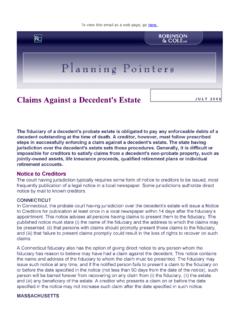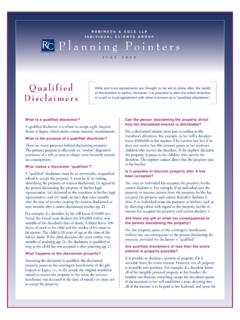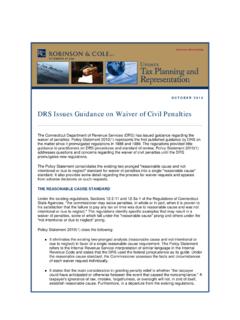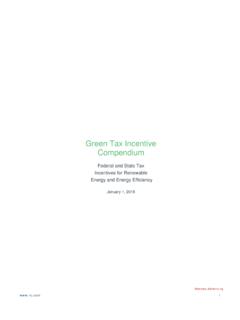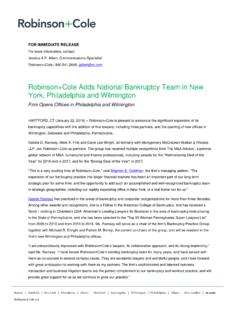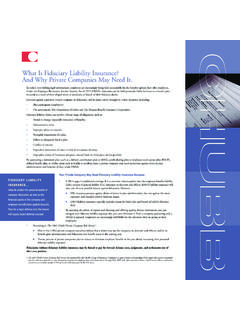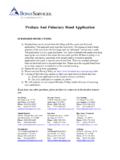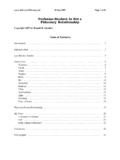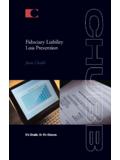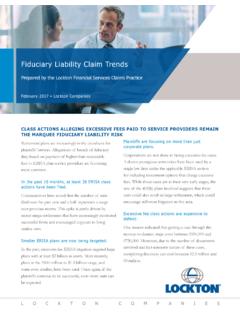Transcription of ERISA Health Plans: Changes and Challenges in the ...
1 Payors Plans & Managed Care 5 ERISA Health Plans: Changes and Challenges in the fiduciary ArenaJean Tomasco, Esquire*Virginia McGarrity, EsquireRobinson & Cole LLP Hartford, CTThe Employee Retirement Income Security Act ( ERISA )1 was first enacted more than twenty-five years ago, yet this broad federal benefits statute continues to challenge nearly everyone involved in employee benefit plans, including the courts. One topic that has been a source of concern and confu-sion and, accordingly, the subject of many agency opinions, regulations, and court decisions over the years is the concept of the ERISA plan fiduciary and the scope of fiduciary duties. The evolving rules and tightening scrutiny of federal regulators and the courts create heightened risks that Health plans and their sponsors or insurers may face more claims alleging breach of fiduciary duties.
2 The Department of Labor (DOL) recently proposed regula-tions that would alter the existing definition of an ERISA fidu-ciary by broadening its scope, and issued new fiduciary - and participant-level fee disclosure regulations. At the same time, the Supreme Court issued its decision in CIGNA Corp. v. Amara,2 which involved a pension plan but has implications for Health benefit plans as well. DOL interprets the Amara case as expanding the potential available remedies for breaches of fiduciary duty, and has taken the position that monetary damages should be available in cases involving disputes over Health benefits. This article focuses on these developments and how they impact Health plans and plan administration.
3 After briefly reviewing some basic ERISA concepts and how ERISA applies to Health plans, the article summarizes existing law regarding ERISA plan fiduciaries and fiduciary duties. It then summarizes the proposed fiduciary regulations and discusses the Amara case, including the DOL s position on : Overview and Application to Health PlansERISA applies to virtually all types of employee benefit plans, including Health and disability With few exceptions,4 ERISA applies to such employee group Health plans regardless of whether benefits are provided through insurance (insured) or funded directly by the employer or union (self-funded). ERISA does not require employers to provide benefits to their employees, nor does it mandate the types of benefits to be Instead, it requires plans to be established pursuant to a written document,6 sets forth reporting and disclosure require-ments for plans, details the claim procedures for Health plans,7 and imposes specific obligations on the entities and persons that administer the plan .
4 ERISA also sets forth the types of legal claims and relief that plan participants can seek if they believe they have been wrongfully denied a benefit under the plan or have other complaints regarding plan Is a plan fiduciary ?Much of ERISA is based on principles of trust law. Given this background, certain parties involved in employee benefit plan administration are considered to be fiduciaries of the plan . ERISA defines a fiduciary as follows:A person [or an entity] is a fiduciary with respect to a plan to the extent (i) he exercises any discretionary authority or discretionary control over the manage-ment of such plan or exercises any authority or control respecting management or disposition of its assets.
5 (ii) he renders investment advice for a fee or other compensation, direct or indirect, with respect to any moneys or other property of such plan , or has any authority or responsibility to do so, or (iii) he has any discretionary authority or discretionary responsibility in the administration of such the Supreme Court has noted, ERISA defines fiduciary not in terms of formal trusteeship, but in functional terms of control and authority over the plan . 9 A person (including an entity) can be a fiduciary by virtue of the level of discretion and control over the administration of the plan or its assets, even if that person does not hold a typical fiduciary position such as a trustee or plan administrator and regardless of whether that person is specifically named as a fiduciary in the plan documents.
6 Someone who has the discretion to interpret plan terms and make final decisions regarding benefits is commonly determined to be a fiduciary of the plan for that purpose. Similarly, a person who has control over plan assets (such as a self-funded plan s bank or trust account) may be found to be a DOL and the courts that have reviewed the issue of fiduciary status make a distinction between ministerial versus discre-tionary For example, a third-party administrator (TPA) that performs only ministerial functions, such as processing claims pursuant to a plan s rules, policies, and procedures without discretion to interpret plan terms or make final decisions in questionable or disputed cases, is usually not a fiduciary .
7 In such cases, another person or entity (typically the plan admin-istrator or claims committee) retains final authority to decide benefit claims, and is therefore the the Lookout for Some New AuthorsPPMC PG is looking for member briefings on interesting issues that you have handled. Can we turn your brief or recent memo into an article? Contact Vice Chair of Publica-tions Anne Hance for more information. Payors Plans & Managed Care 6 The fact that a person or entity says or believes that it is not a plan fiduciary has little bearing on whether that person or entity is in fact a fiduciary . Further, a disclaimer of fiduciary status in an administrative services agreement or in a plan document such as a summary plan description (SPD) is not dispositive of fiduciary status.
8 A functional approach to determining fiduciary status applies, and numerous courts have found persons or entities to be fiduciaries even in the face of express contractual language disclaiming the fiduciary Duties Under ERISAThe basic duties of an ERISA fiduciary with respect to an ERISA -covered plan are: Undivided Loyalty Act solely in the interests of participants and beneficiaries; Exclusivity Act for the exclusive purpose of providing plan benefits or for defraying reasonable expenses of plan administration; Prudence Exercise the care, skill, prudence, and diligence that a prudent person acting in a like capacity and familiar with such matters would use in the conduct of an enterprise of a like character and with like aims; Diversification Diversify the plan s investments to minimize the risk of large losses; Adherence to plan Documents Act in accordance with the documents and the instruments governing the plan insofar as those documents and instruments are consistent with with these duties, a Health plan claims fiduciary is expected to administer benefits in a manner that is fair to all of the plan participants and takes their interests into account.
9 This does not mean that the plan must approve every benefit claim; indeed, a claims fiduciary is bound to follow the plan docu-ments as written (unless they conflict with ERISA ) and should deny claims that are unsupported or excluded by plan terms. If, however, a claims fiduciary has a potential conflict of interest (for example, an insurer who both decides and pays claims), it should take steps to reduce any potential bias and promote accuracy, such as by separating the claims determination process from the financial side of the business. Further, if a benefits decision is subsequently challenged in court, the existence of a conflict of interest is a factor that may be taken into account in determining whether a claims administrator has abused its Health plan fiduciary responsibilities include the prudent selection and monitoring of service providers such as TPAs or COBRA administrators and healthcare providers, including determining reasonable compensation for such service providers.
10 DOL has taken the view14 that a responsible plan fiduciary must engage in a prudent selection process and must take into account the qualifications of the provider, the quality of services offered, and the reasonableness of the fees fiduciary Status of Administrative Service Providers and the DOL s Proposed Regulations As noted, a company or person providing administrative services to an ERISA -covered Health plan may be a fiduciary , depending on the type of service provided and the level of discretion and control over the plan and its assets. Service providers that have been found to be ERISA fiduciaries include TPAs, insurance companies and agents, and consulting firms. Although the defini-tion of a fiduciary has always included administrative service providers responsible for the selection of investments (so-called investment advisors), DOL has proposed regulations that would significantly expand the types of advice and recommendations given to a plan , plan fiduciary , participant, or beneficiary that may lead to ERISA fiduciary proposed regulations would amend regulations issued in 1975 that use a five-factor test to define when a person is consid-ered an ERISA fiduciary by reason of giving investment advice.
